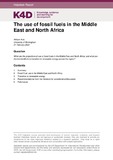| dc.contributor.author | Avis, William | |
| dc.coverage.spatial | MIddle East and North Africa | en |
| dc.date.accessioned | 2020-03-17T12:45:39Z | |
| dc.date.available | 2020-03-17T12:45:39Z | |
| dc.date.issued | 2020-02-21 | |
| dc.identifier.citation | Avis, W. (2020). The use of fossil fuels in the Middle East and North Africa. K4D Helpdesk Report. Brighton, UK: Institute of Development Studies. | en |
| dc.identifier.uri | https://opendocs.ids.ac.uk/opendocs/handle/20.500.12413/15165 | |
| dc.description.abstract | This rapid literature review collates evidence from academic and grey literature on the use of fossil fuels in the Middle East and North Africa (MENA). MENA, for much of its recent history, has been known for its energy wealth. The region is, however, significantly diverse, not only in terms of economic and political structures, but also in terms of energy resource and infrastructure. MENA countries depend heavily on fossil fuels for energy supply and domestic consumption. The region's countries are rapidly growing energy consumers, a product of the growth in gross domestic product (GDP), population, and the pressures of urbanisation. It is estimated that energy demands could increase by more than 5% per annum in the future Estimates suggest that in 1971 fossil fuel energy consumption represented 95.08% of total regional energy consumption, this peaked in 2008 at 98.71%. As of 2015 fossil fuel energy consumption represented 97.38% of total energy consumed highlighting the limited uptake of alternative fuel sources. The political economy of energy in MENA is characterised by a set of unique regional factors: the availability of large supplies in conventional oil and gas resources; the pivotal role played by hydrocarbon wealth in many MENA oil and gas producers’ economic development since the 1960s and 1970s; and the particular social contract in many MENA countries where energy has, for many decades, been considered a public good to be provided by governments, if not for free, then at prices that have in many cases been merely a fraction of their price in any other international market for most of these countries’ modern histories. | en |
| dc.language.iso | en | en |
| dc.publisher | IDS | en |
| dc.relation.ispartofseries | K4D Helpdesk Report;763 | |
| dc.rights.uri | https://www.nationalarchives.gov.uk/doc/open-government-licence/version/3/ | en |
| dc.subject | Economic Development | en |
| dc.subject | Environment | en |
| dc.subject | Governance | en |
| dc.title | The Use of Fossil Fuels in the Middle East and North Africa | en |
| dc.type | Helpdesk | en |
| dc.rights.holder | © DFID - Crown copyright 2020 | en |
| dcterms.dateAccepted | 2020-02-21 | |
| rioxxterms.funder | Department for International Development, UK Government | en |
| rioxxterms.identifier.project | K4D | en |
| rioxxterms.version | VoR | en |
| rioxxterms.funder.project | 238a9fa4-fe4a-4380-996b-995f33607ba0 | en |

